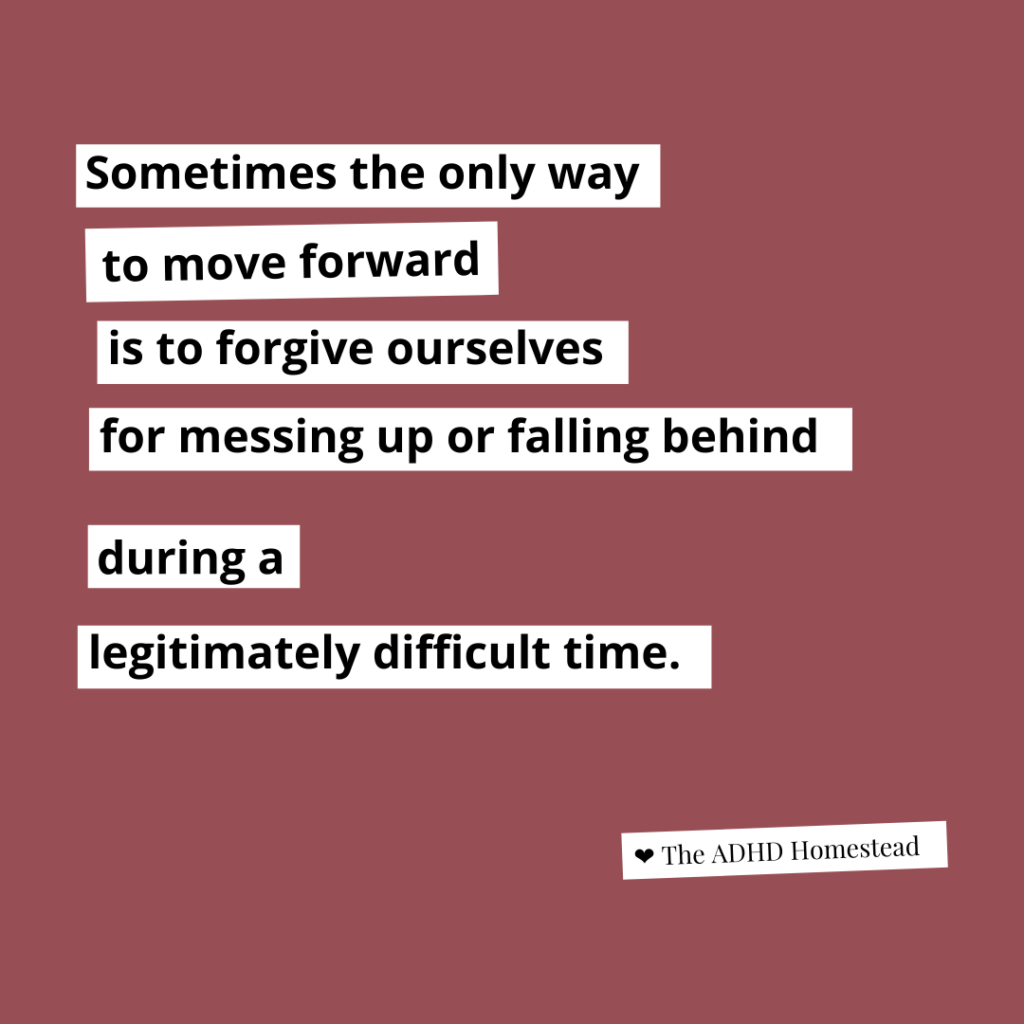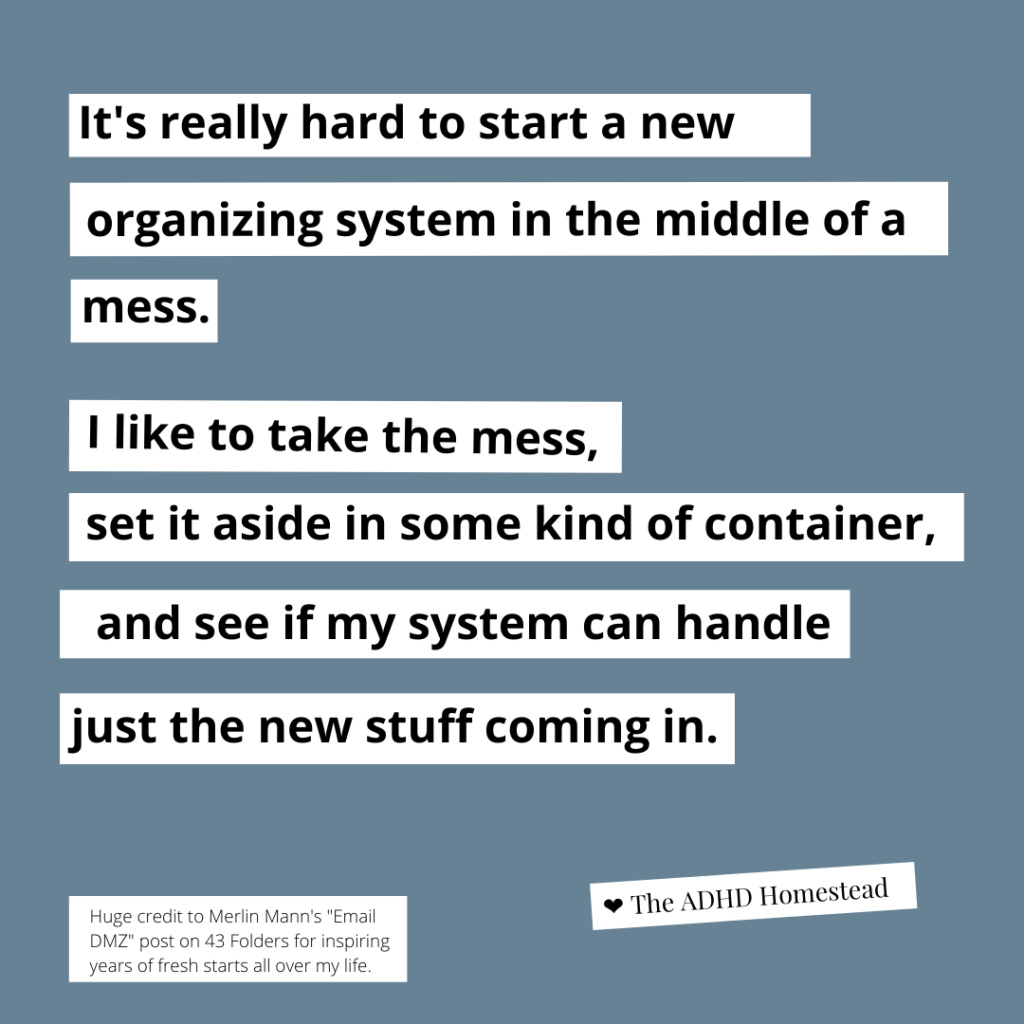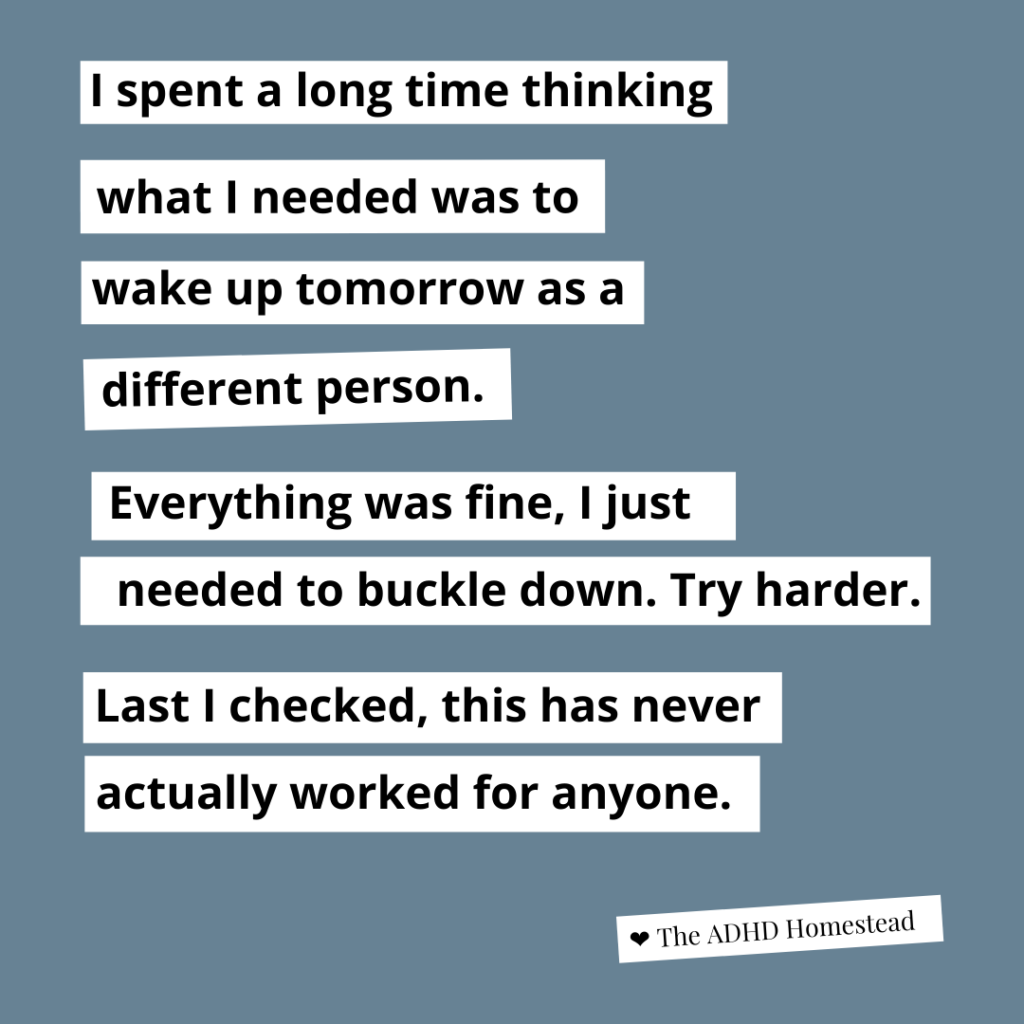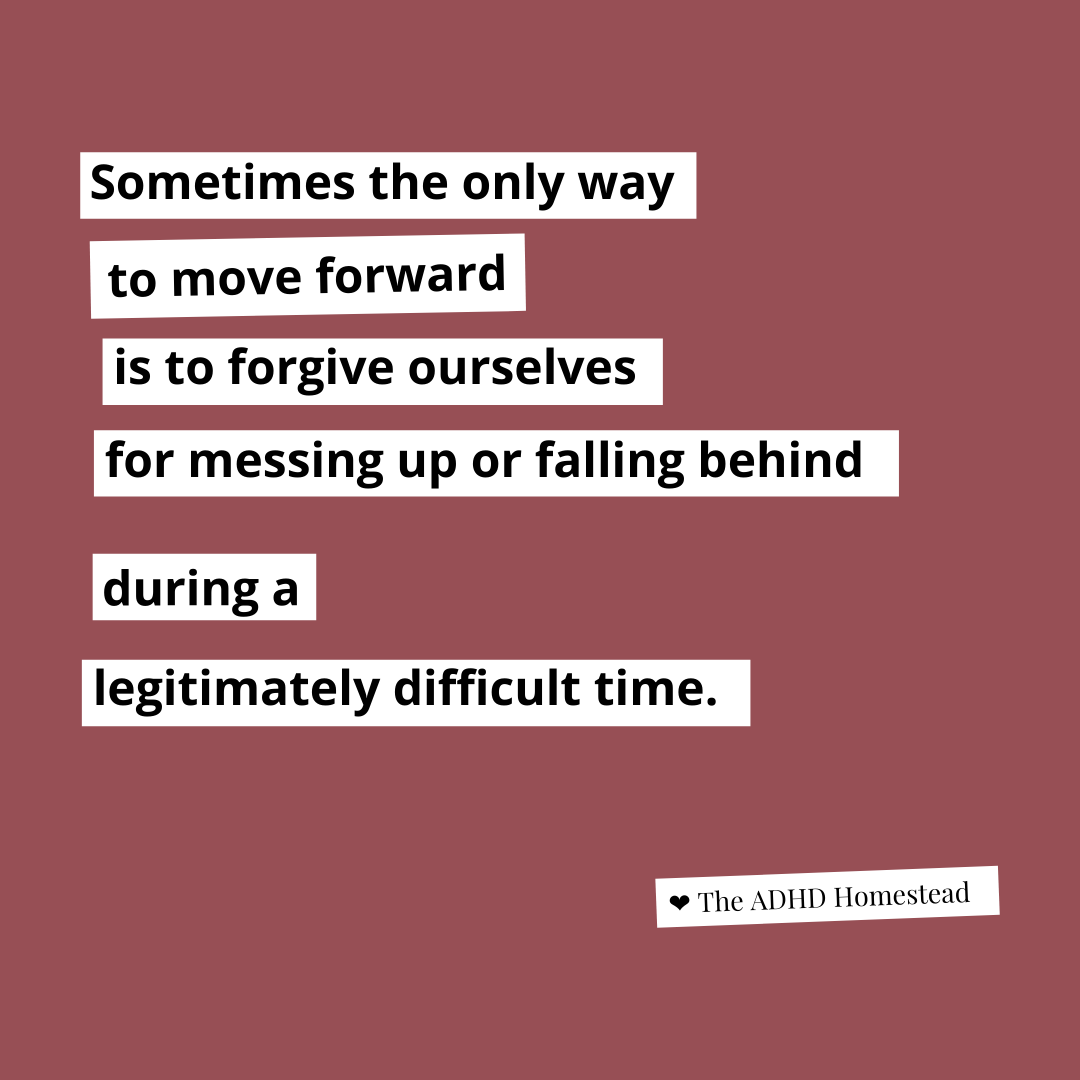In the past couple sessions of our Order from Chaos workshop on Patreon, we’ve talked about getting behind. Letting the piles take over. ADHD makes this easy to do. It also makes it hard to undo.
This might sound like a dim outlook, but it is possible to get caught up. The key is to separate that goal — getting caught up — from the everyday grind of staying caught up. When we combine them, we decrease our chances of succeeding at either. Our piles keep growing.
Trying to “catch up” really just catches us in a cycle of perfectionism.
The past year and a half has been a challenge. I’ve let piles accumulate. Distractions from stress, virtual school, and other pandemic stuff overwhelmed me. My grandmother died and I inherited a huge box of photos and documents to digitize for the family archives. I haven’t always had the energy to keep the house as clean as I’d like. Where I wanted to write two or three books, I finished zero. In short, I’ve gotten behind on everything.
Everywhere I look, I see something I need to catch up on. The living room I said I’d paint four years ago. The overflowing in-basket next to my desk. Sometimes the entire house feels like a monument to things interrupted or left undone.
I’m working on being okay with that. It’s the only way I’ll make forward progress.

ADHD has given most of us a breadth of experience with falling short. If a task feels too big — if my ADHD-self thinks we might not be up to it — sometimes I prefer to back away slowly rather than make any attempt at all. It’s self-preservation: failure hurts. Letting others down hurts. Avoidance feels a whole lot safer.
And so, if I see no hope of catching up on the piles, it’s easier to let them get bigger.
Our organizing systems help us stay — not get — caught up.
I craft my organizing strategies to deal with incoming stuff: opening this week’s mail. Keeping the floor vacuumed. Mowing the lawn. Putting away groceries after bringing them inside. Staying on top of deadlines and paying the bills.
This sounds simple, but it’s a lot of work for someone with ADHD and an absentee working memory. I need to keep track of almost everything on paper (or a digital equivalent). My life is much more intentional than most people I know.
I’ve made my peace with this and I try to keep my ongoing responsibilities manageable. This means whatever I need to do to keep on top of my stuff, it should feel manageable on any given day. And those are normal days, not the imaginary ideal days I always expect to happen tomorrow.
If I ask my everyday organizing strategies to also handle clearing the past eighteen months’ backlog, they will collapse. It’s too much. And as those systems collapse, I will fail to handle new and incoming stuff, which will cause me to fall even further behind.
This leads to a drowning feeling I’m sure many of my ADHD pals know all too well.
Separate getting organized from staying organized.
My solution to this is to keep the task of getting organized far removed from the task of staying organized. Even when I’m behind, I prioritize the new stuff. In my book Order from Chaos I make an analogy to a leaky pipe in the basement. You’ll never finish bailing out the water unless you first stop the flow.
Combining the getting and the staying parts often leads to a.) giving up on the whole organizing system because it’s “not working out,” b.) never getting caught up, and/or c.) continuing to miss/lose/run late on new important things.
Here’s how I tackle things when I feel super behind:
Contain the piles and mess
I find a container and physically separate the backlog pile from anything new. This idea comes from an old 43 Folders post by Merlin Mann titled, Fresh Start: The Email DMZ. In Mann’s words, by drawing this separation between the old and the new, “You’re saying Okay, starting this minute I quit letting ‘being behind’ stop me from making good decisions now and going forward.” I do this for everything, not just email. Box up the backlog so you can actually see what the incoming flow looks like.

Focus on right now and prioritize incoming stuff
With my eyes averted from the piles, I focus exclusively on new stuff and prevent those piles from getting any bigger. That means handling all of today’s email before I work my way into yesterday’s. Opening this week’s mail before digging into that stuffed in-basket next to my desk. Usually it takes less time than I think it will once I let go of the distraction and anxiety from those piles. Often, important stuff will surface in the present anyway — for example, replies on an email chain.
Make clearing the backlog its own project
Eventually, the backlog does need to be cleared. I can’t box it up and ignore it forever. I set aside time for this separate from daily or weekly handling of incoming stuff. That way, it doesn’t make the incoming stuff feel impossible. Have a few extra minutes and don’t know what to do with it? Let’s handle a few things from this inbox. Husband talking to me while he washes dishes? Let’s grab some cleaner and wipe off the top of the range hood. Feeling extra stressed? Block out some time on Saturday afternoon to work on the backlog and ask my family to support me in this use of time.
Now, some stuff will never be dealt with. This is the cost of getting behind. We are not entitled to every opportunity, and we must let some go. This might mean:
- As Mann recommends in his post, archiving all unread emails from before a designated date
- Making some budget sacrifices to pay a contractor for a one-off job you wanted to do yourself
- Giving away the beat-up coffee table you’ve stashed in the basement for three years as a great potential “project piece”
Simplify and adapt
Failure is part of life. We all get overwhelmed and fall behind sometimes. Whatever. Let’s agree today to start forgiving ourselves for that.
However, watch what happens once you hide the piles and work from a clean slate. Consistently falling behind even under normal circumstances means something needs to change — and it’s not you. I spent so long thinking I needed to be different or try harder or any number of variations on waking up tomorrow morning as a different, more successful person.
This is not reasonable. If I can’t keep up, I’m either expecting too much or expecting the wrong things. My systems for staying organized have to fit me as an individual, not the other way around. And even the most perfect system won’t make me a superhero. Sometimes it’s not a new planner we need, but fewer things to put in the one we have.
That’s the Order from Chaos ethos, really. Manage your life in a way that fits you — your brain, your values, your priorities — rather than trying to cram yourself into a mold you’re never going to fit. If you want to continue this conversation, sign up for my ADHDgram monthly email list. Fall workshops start September 2 and not only will my ADHDgram friends get first dibs after my patrons for workshop signups, they’ll get an exclusive discount. Hope to see you there!

Hey there! Are you enjoying The ADHD Homestead?
Here's the thing: I don't like ads. I don't want to sell your attention to an advertising service run by the world's biggest data mining company. I also value my integrity and my readers' trust above all, which means I accept very few sponsorships/partnerships.
So I'm asking for your support directly. For the cost of one cup of coffee, you can help keep this site unbiased and ad-free.
Below you will find two buttons. The first lets you join our crew of Patreon pals and pledge monthly support for my work. Patrons also have access to my Audioblogs podcast. The second takes you to a simple donation page to pledge one-time or recurring support for The ADHD Homestead, no frills, no strings. Do whichever feels best for you!

